Warning: this report contains explicit language.
It all started on WhatsApp.
The first in a cascade of U.S. Navy investigations into sailors accused of trafficking, housing and pimping female prostitutes in the Middle East can be traced back to June 2017 and a string of sex-charged encrypted text messages between a sailor in Bahrain and a Thai prostitute he met on the island.
“Yo u sexy than a mother fucker with your mean ass,” Gunner’s Mate 2nd Class Jihad H. Littlejohn had texted the woman on June 4, 2017, according to Navy court records.
Prosecutors would later allege that Littlejohn, a 29-year-old from New Jersey then assigned to the patrol ship Hurricane, had paid the so-called “working girl” for sex.
“I want to sleep on your titty,” the sailor had texted her.
“Lol you gotta pay,” she replied, according to court records.
But the woman, Lin Raiwest, was more than just another prostitute. Court records show she also was known as a “mamasan,” a pimp who managed her own stable of prostitutes that she trafficked, protected and profited from.
Raiwest’s chats with Littlejohn soon turned to bigger business, prosecutors later alleged.
Court records show she told him she was going to buy “some more girls” from Thailand and would put them to work in Bahrain’s lucrative sex trade ― one often fueled by U.S. military personnel stationed there.
“You want some?” she asked the sailor in a text.
“Hell yea I do,” Littlejohn replied.
“Girls for what?” he asked.
“Work. Make money,” Raiwest answered. “Don’t tell nobody tho.”
RELATED

Navy prosecutors later cited the text message exchange to allege that the duo had hatched a plan to fly several women in from Thailand, house them in Littlejohn’s off-post apartment and put them to work selling sex, with Littlejohn expected to take a cut of their earnings.
The petty officer would “take their passports, take their freedom,” Navy prosecutor Lt. Ty Christian said at Littlejohn’s trial in August 2019.
To seal the deal, Littlejohn allegedly paid Raiwest 1,000 Bahraini dinar (about $2,650 at the time) to front the cost of getting the prostitutes from Thailand to Bahrain, according to court records.
In return, Raiwest gave him her passport as collateral.
Naval Criminal Investigative Service agents raided Littlejohn’s apartment in September 2017 and found Raiwest’s passport hidden in a safe, according to court records and testimony.
For reasons that remain unclear, Raiwest didn’t testify at Littlejohn’s trial and the petty officer was acquitted on all charges last summer.
But in 2017, this alleged partnership between Littlejohn and Raiwest — chronicled in the text messages she provided to NCIS — helped spark a web of investigations that revealed how deeply involved some U.S. sailors had become with the commercial sex trade in Bahrain.
Throughout the next year, those probes uncovered evidence that sailors were housing prostitutes in their taxpayer-funded apartments, seizing the women’s passports and taking a cut of the women’s earnings, profiting from a sex trade that serviced shipmates who lived on the island or came ashore during port calls.
Allegations of brutal sexual assaults on the vulnerable woman also came to light, as did evidence of at least one sailor acting as an enforcer for local prostitutes, shaking down a shipmate for payments.
Raiwest emerged as a central figure in several of the Navy’s investigations. Court records show the woman was well-known among sailors in Bahrain
She was also a longtime confidential NCIS informant, plying her illicit trade, reporting sailor misconduct and collecting cash rewards in the process.

These revelations — contained in hundreds of pages of court records, video footage and investigative documents obtained by Military Times — for the first time lay bare the extent of U.S. sailor sex crimes in Bahrain and the Navy’s high-level effort to crack down on the problem and discipline those sailors.
The cases also raise questions about why Navy leadership didn’t see this coming.
For years, U.S. sailors and prostitutes have lived, drank and slept together near “American Alley” in the Juffair section of Bahrain’s capital, Manama.
This warren of bars, nightclubs and apartment blocks sits just outside the gates of Naval Support Activity Bahrain, the headquarters of U.S. 5th Fleet, where about 7,500 American sailors are stationed to oversee naval operations across the volatile U.S. Central Command region in the Middle East.
Yet by 2017, sailors were not just patronizing prostitutes. The NCIS investigations revealed a shadowy subculture outside the gates of NSA Bahrain that had metastasized into multilayered enterprises with sailors as profiteers. The misconduct flew in the face of the Pentagon’s anti-trafficking policies and attendant online training programs that troops from all services must regularly complete.
Some evidence suggests the involvement of U.S. sailors was widespread. One accused chief told NCIS agents in 2018 that he believed up to 15 percent of sailors assigned to Bahrain were housing prostitutes in their off-post apartments.
“He stated many other sailors do not think you can or will actually get in trouble for patronizing prostitution or hosting foreign nationals,” in their off-base residences, a NCIS summary of the interview states.
That chief, who told NCIS agents he had patronized 10 to 15 prostitutes in Bahrain in 2017, said he “knew several of the women he paid to have sex with were engaged in debt bondage, owing their 'mamasan’ approximately 2,500 [Bahraini dinar, or about $6,600], for coming to Bahrain,” one NCIS report states.
According to NCIS records, another sailor told agents that “service members have been housing women for profit since at least 2012, when he was previously stationed in Bahrain.”
That service member — whose name was redacted in the records NCIS released publicly — told agents that, “Sailors would typically hold (the women’s) passports to ensure they received money owed to them.”

For many sailors, it was all about the cash.
“A lot of people in the Navy talk about it, it’s an easy way to make money” an NCIS agent said to another chief who was busted trying to traffic women, move them in, seize their passports and take his own cut of their earnings.
“It’s all around,” a senior chief told NCIS agents in October 2017.
At least nine sailors, including five chiefs and a lieutenant commander, have been charged since 2017. A senior chief and lieutenant junior grade were among at least six other sailors who have been administratively disciplined in connection to such infractions.
But even now, the full scope of the NCIS investigations and the court cases they spawned remains unclear because the Navy has refused to release some court records while slow-rolling the release of other files that Military Times requested nearly a year ago.
Military Times began investigating the sex trade in Bahrain after several cases first popped up on Navy dockets in 2018.
In January of that year, word of the NCIS investigations reached the desk of then-Vice Adm. John Aquilino, the three-star who was overseeing 5th Fleet and Navy operations in the Middle East.
While unusual for a senior commanding officer to get directly involved in deckplate discipline, Aquilino felt the need to speak on the troubling reports.
He convened an all-hands meeting with hundreds of sailors from his waterfront commands that month.
Military Times obtained an audio recording of that all-hands, and Aquilino’s outrage rings out.
“Who thinks it’s okay to bring foreign nationals into this nation and take their passport and push them out for service to both yourself and anyone else, one of your buds?” Aquilino had asked. “Who thinks that’s okay?”
“The cases have spanned rates and ranks, and the large number of them are senior and khakis,” said Aquilino, now a four-star admiral in charge of the Navy’s Pacific Fleet.
“Floors me,” he told the sailors. “Absolutely floors me.”
His voice rising, Aquilino vowed to “beat this out of our organization” and warned sailors that the actions of a few could blemish the service to which they had all sworn their loyalty.
“Our Navy took a huge black eye with the collisions in 7th Fleet,” Aquilino said, referring to fatal ship collisions in Asia that killed 17 sailors in 2017.
“I’m not letting our Navy take another black eye.”

Big Navy insists the sex trafficking problems in Bahrain are now under control. Officials told Military Times that no new cases of trafficking, solicitation, or other such crimes have been reported among sailors in Bahrain since late 2018.
The Navy also increased training for sailors about the realities they will encounter in Bahrain.
Capt. Greg Smith, the current commanding officer of NSA Bahrain, acknowledged in a fall 2019 interview the reality on the ground and the challenges to changing sailor behavior.
“We are certain that this is a big problem,” said Smith, who took command in the summer of 2018. “We recognize that we don’t have all the answers…and we’re not declaring victory.”
Smith said the Navy has been working to reduce interactions between sailors and prostitutes by declaring certain establishments in Bahrain off limits to sailors, while hammering home how such behavior runs counter to Navy values.
Yet holding sailors accountable has not been easy. When Navy prosecutors tried to court-martial sailors for misconduct involving prostitutes, some cases were severely weakened or failed because Thai prostitutes at the center of the investigations did not testify.
Bahraini government officials did not respond to repeated requests for comment on this story.
Shore patrol logs obtained by Military Times also suggest the higher-ups were aware of how some sailors were spending their nights at various off-base watering holes. One November 2017 report showed 35 to 40 sailors at Wrangler, a popular nightclub. More than 100 suspected prostitutes were in attendance.

Corey Bean, a lawyer and Naval Reservist, was assigned to Bahrain from 2016 to 2019 and was a defense attorney on several of the Navy’s sex-trade-related cases there.
Now back in stateside civilian practice, Bean suspects that willful ignorance of the problems in Bahrain was the plan of the day by 2017.
“Unless it was flagrant, unless somebody really waved it in the face of leadership, no one was looking for it, so it could go undetected,” Bean said. “Nobody really cared to pursue what I think everybody kind of figured was going on.”
“They didn’t quite know how to address it or thought through how to address it,” he added.
“Until they had to.”
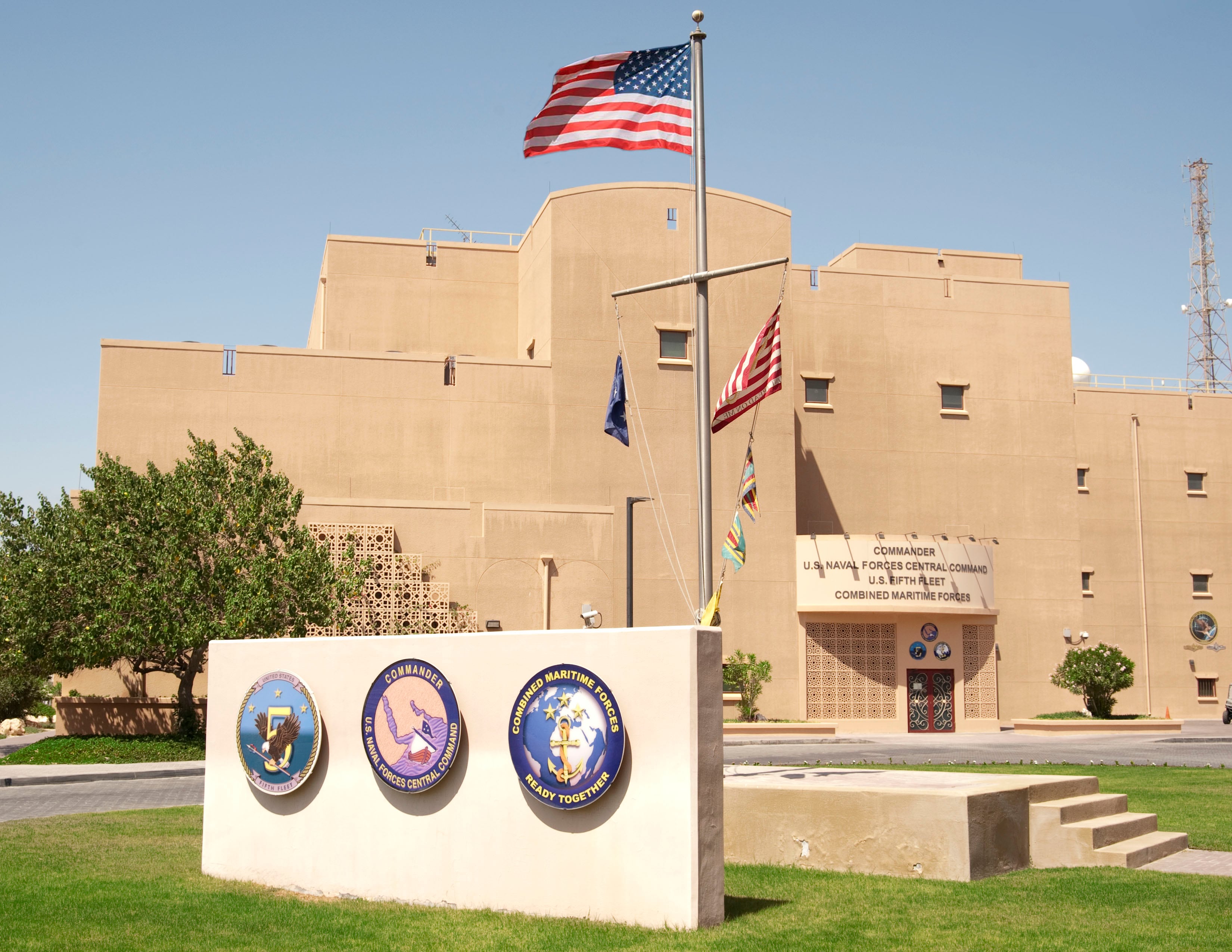
‘Keep the money’
If the alleged scheme between Littlejohn and Raiwest had come together, the petty officer could have supplemented his E-5 pay by housing Raiwest’s women and taking a cut of their earnings, according to court records.
Court records suggest that such arrangements could amount to hundreds of dollars worth of extra income a month.
“I’m bout to stack this paper,” Littlejohn had texted Raiwest in June 2017, according to court records.
But by July, prosecutors alleged, the deal between the two soured, and the trafficked women never showed up at Littlejohn’s apartment.
He was out roughly $2,600 that he had fronted to Raiwest to bring the prostitutes to Bahrain, according to NCIS records and Navy prosecutors.
The two began to argue as the alleged scheme unraveled.
“You played me,” he texted Raiwest on July 21, according to court records.
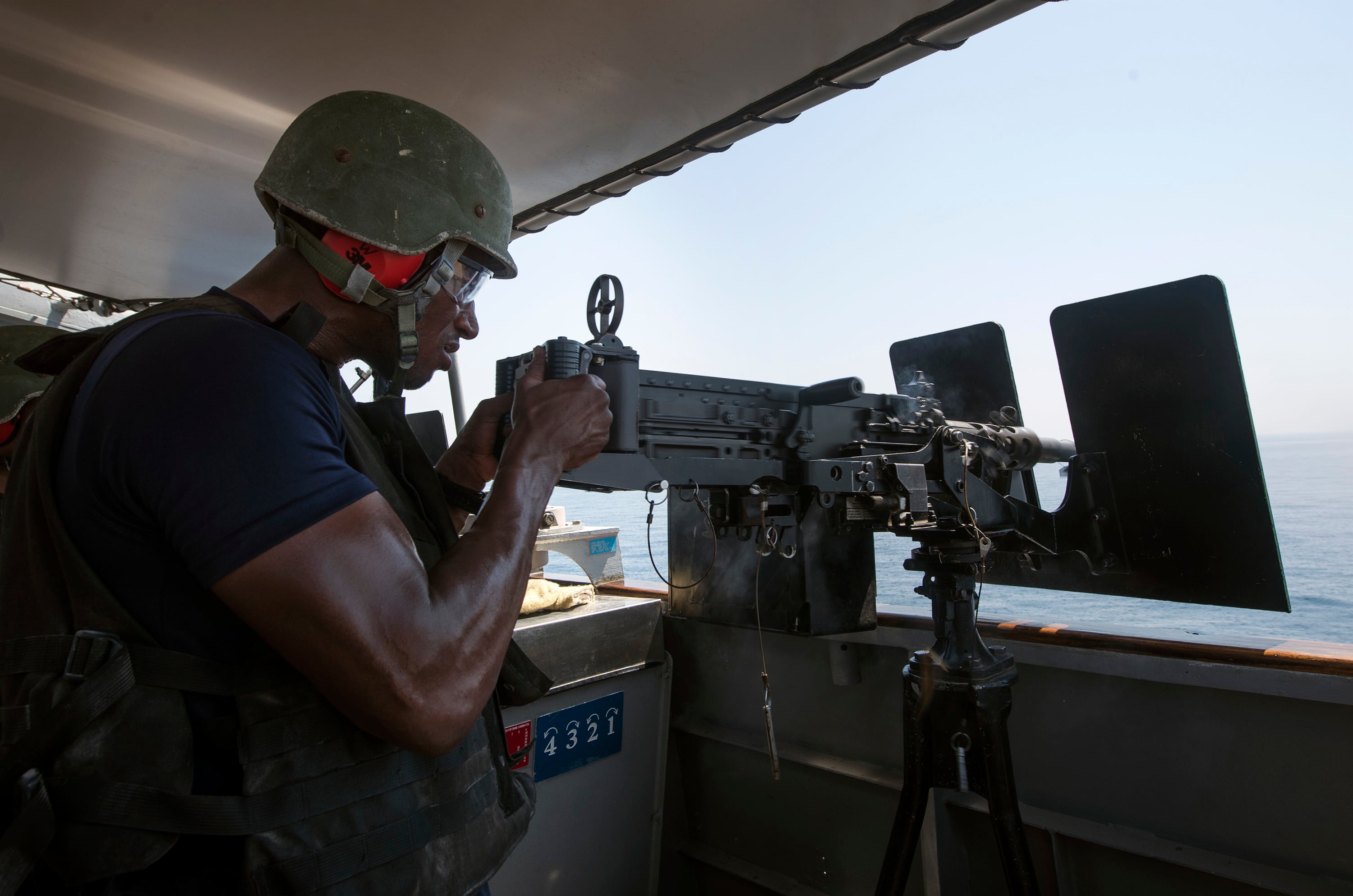
Raiwest insisted it was not her fault.
“Your girls ran away and you rushing me to pay you back?” she wrote.
On July 27 2017, Raiwest told Littlejohn it would be another week before she could pay him back.
“I just got a new place and sent some bitches that not listen home,” she texted.
“Fuck it,” Littlejohn texted her on Aug. 6. “Keep the money.”
Littlejohn still had one way to pressure Raiwest: He had her passport that she had given him as collateral when he fronted the $2,600, according to court records.
RELATED
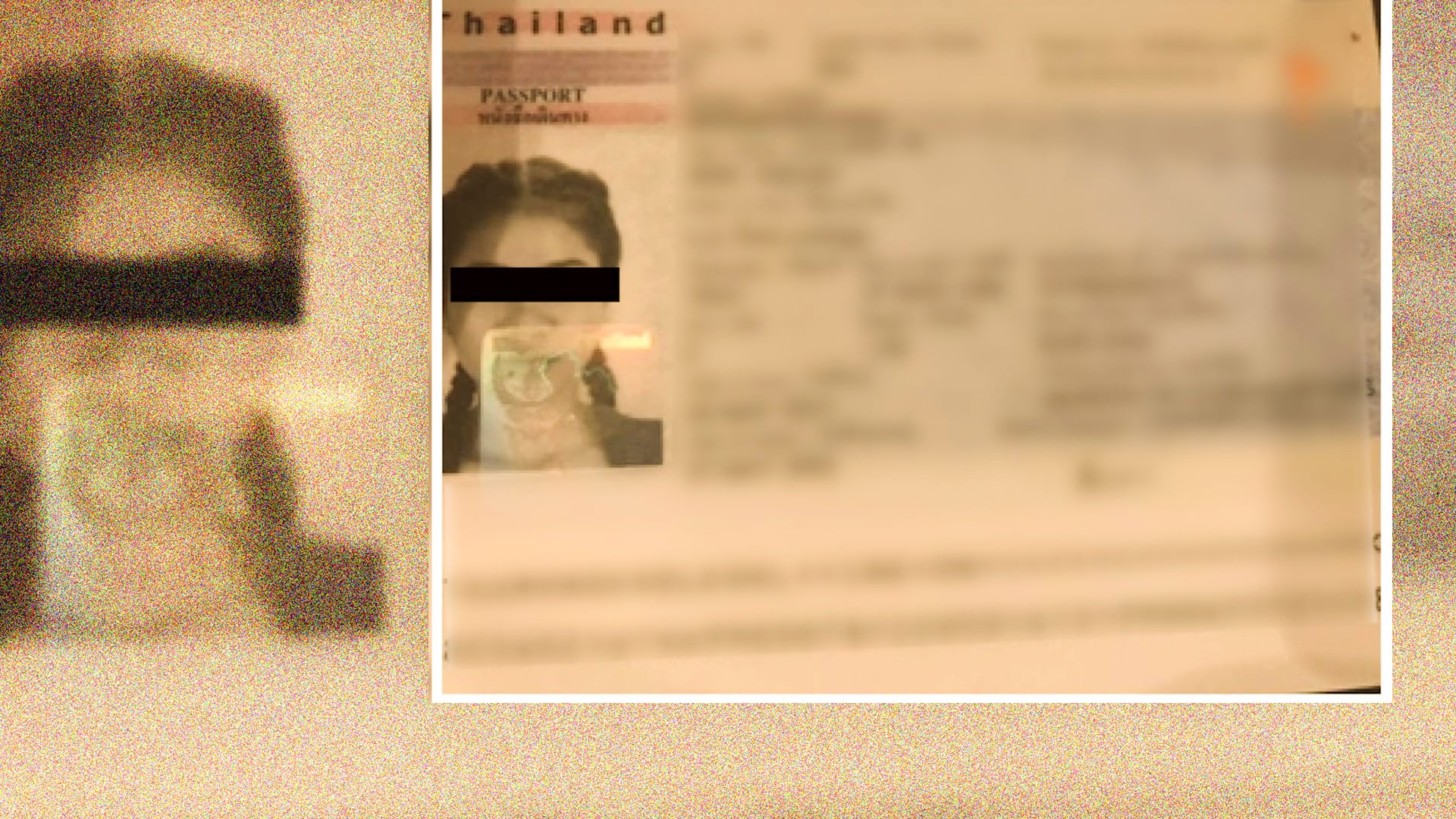
“I’ll give your passport to the police,” the sailor texted her.
But Raiwest was not intimidated.
“You not going to threaten me with this police bullshit,” she warned. “Trust me, it’s not worth it.”
“You going to police,” Raiwest said, “I’m going to NCIS.”
She did just that on Aug. 30, 2017, according to court records and testimony. Raiwest met with NCIS agents, alleging their failed scheme and turning over her long text exchanges with the petty officer.
The following month, NCIS agents raided Littlejohn’s apartment and found Raiwest’s passport hidden in a safe, court records show.

Navy prosecutors filed charges against Littlejohn in 2018. He initially faced charges of conspiring with Raiwest to traffic women and for paying her 1,000 Bahraini dinars to make it happen, among other alleged crimes.
But by the time of his August 2019 trial at the Navy Yard in Washington, D.C., several charges had been withdrawn.
Navy officials declined to say why those charges were withdrawn, but prosecutors had been unable to wrangle Raiwest into testifying against Littlejohn for reasons that Navy officials also refused to explain.
“You’re not going to hear from Ms. Raiwest,” prosecutor Lt. Ty Christian told the jury at the trial’s opening.
After the prosecution rested its case against Littlejohn, the military judge presiding over the case, then-Cmdr. Ryan Stormer, granted a motion from Littlejohn’s defense attorney to dismiss the two most serious remaining charges that involved Littlejohn confiscating and possessing Raiwest’s passport, and for transporting sex workers by means of fraud and coercion.
By the time a military jury began deliberating, Littlejohn was only facing a single charge for paying Raiwest for sex.
After an hour of deliberation, the court-martial panel found him not guilty.
Without Raiwest on the stand, the prosecution hinged mainly on text messages between the two.
Littlejohn’s civilian defense attorney, Phillip Cave, told Military Times after the trial that he was prepared to argue that the texts involved a plan the duo had to start a tattoo business.
But he declined to say how Raiwest’s passport ended up in a safe in Littlejohn’s apartment.
“I’m not going to comment on that,” Cave said.
The Navy’s failure to get Raiwest and other prostitutes to testify in court would become a reoccurring challenge in several cases targeting sailors accused of involvement in the Bahrain sex trade.
The Navy’s mamasan in Bahrain
The woman known as Lin Raiwest was far more than just another expat prostitute.
By the time her alleged scheme with Littlejohn collapsed in 2017, court records show Raiwest was a power player among some sailor circles in Bahrain.
Known for her amateur tattoo skills and a hard-partying lifestyle, the streetwise, imposing, at-times jewelry-draped young woman was a fixture in the off-duty underworld, a dolled-up socialite who lived just outside the gates of the Navy base in an upscale glass-and-concrete tower known as the Heavenly Plaza apartments.
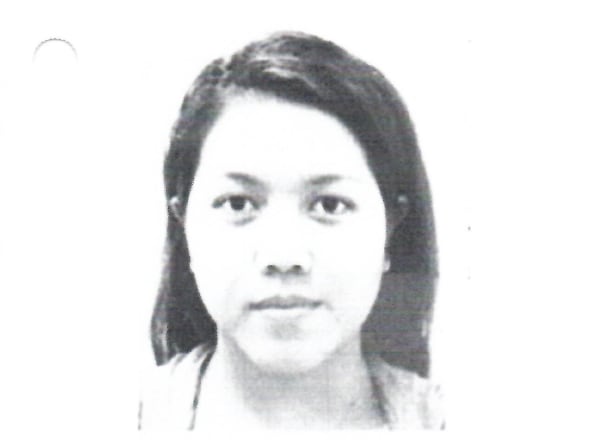
But court records indicate she moved often and lived at times with up to six other women in an apartment, eschewing medical care and other services.
Court records also suggest she dealt with jealous and possessive clients who didn’t like her taking business from other men.
Known by some shipmates as “Kaylina” and to others as “Kay,” she held court at boozy brunches sailors attended on the weekend, hosted parties with U.S. personnel and pimped her own stable of prostitutes.
“She was very well-known among the sailors, among the community, even among those that did not use her services,” Brian Pristera, a Virginia attorney who represented a Navy chief charged and later acquitted in a case related to Raiwest, told Military Times.
Raiwest managed her prostitutes “with the focus on sailors and U.S. service members stationed in or stopping in Bahrain,” he said.

“She’s just a very public person in the area,” one petty officer testified in 2018.
Court records show one sailor texted that “Kaylina gots [sic] so many connections on base” to a buddy in late 2017.
But likely unbeknownst to her American acquaintances on the island, Raiwest had been an NCIS informant since 2014 and is designated under the code name MEBJ-1580 in agency and court records.
So while she continued her work as a prostitute and mamasan, Raiwest could also if needed turn to NCIS Special Agent Stanley Garland, the agent whom she’d known and secretly worked with for years.
“This is a calculating individual that knows what she’s doing and knows how to play this game,” Pristera said in court in 2018. “NCIS just kind of lets her do her own thing.”

How much NCIS paid Raiwest over the years remains unclear, but records show agents paid Raiwest $900 after searching Littlejohn’s apartment in September 2017 and finding her passport locked in a safe there.
NCIS records state the payment was to cover fees associated with Raiwest overstaying her visa, but at Littlejohn’s trial, NCIS Special Agent Elise Stephens called the payout “reward money.”
“This was a woman who was…very powerful,” Pristera told Military Times. “She was using that relationship [with NCIS] and taking full advantage of the fact that she had NCIS as a silent partner, almost.”
Garland testified in a separate trial in 2018 that he brought Raiwest on as an informant in 2014.
“She knew a young lady that had been assaulted by a sailor and brought her to us,” Garland said. “That began our relationship.”
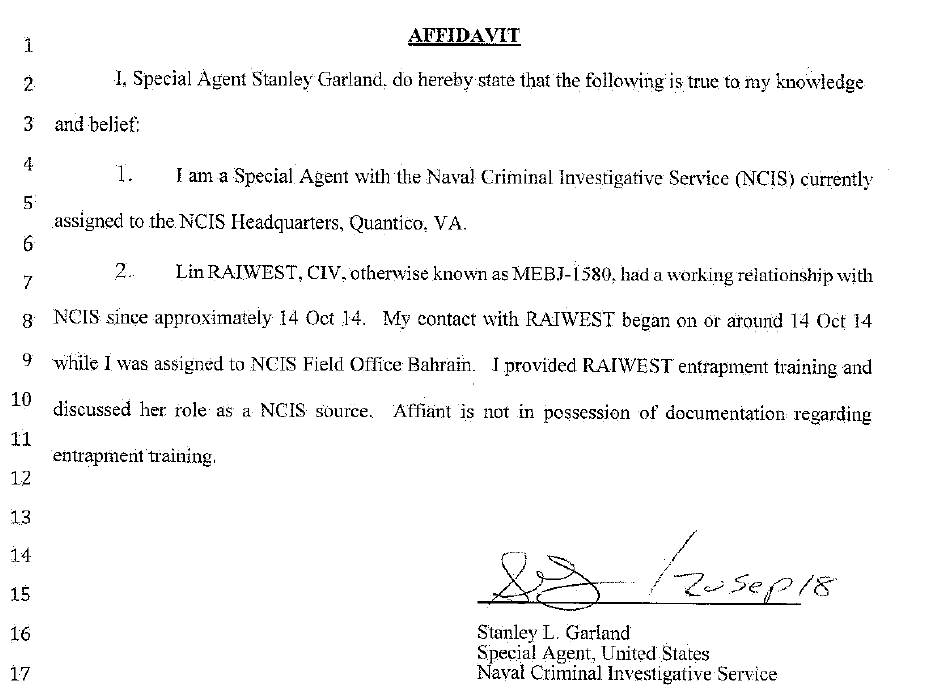
While the Littlejohn situation was still under investigation, Raiwest would bring three of the Thai prostitutes she worked with to NCIS in the fall of 2017, with all three alleging — via their mamasan’s translation from Thai to English — that a Navy chief had brutally raped them.
Go here to read more about one of the women who accused the chief of rape.
RELATED

Garland said in court that he “terminated her” as a source at his boss’ direction in 2018 when Garland transferred back to the states.
Garland declined comment when contacted by Military Times and referred questions to the NCIS public affairs office.
NCIS officials declined to comment on Raiwest’s history with the agency. The agency has also denied Military Times public records requests for documents showing how much Raiwest was paid and the nature of the cases she was involved in, as well as how many other pimps and prostitutes may have similar paid-informant relationships with the NCIS office in Bahrain.
Pristera also had problems getting more information about Raiwest from NCIS, according to court records.
A military judge ordered Raiwest’s NCIS file sealed during another trial.
“There’s a lot we don’t know that we wanted to know about Lin Raiwest and her relationship with the Navy,” Pristera said.
Military Times attempted to track down Raiwest and received an email from someone in 2019 purporting to be Raiwest.
But a Military Times reporter was unable to verify the identity of the sender, who declined to comment on the record.
RELATED
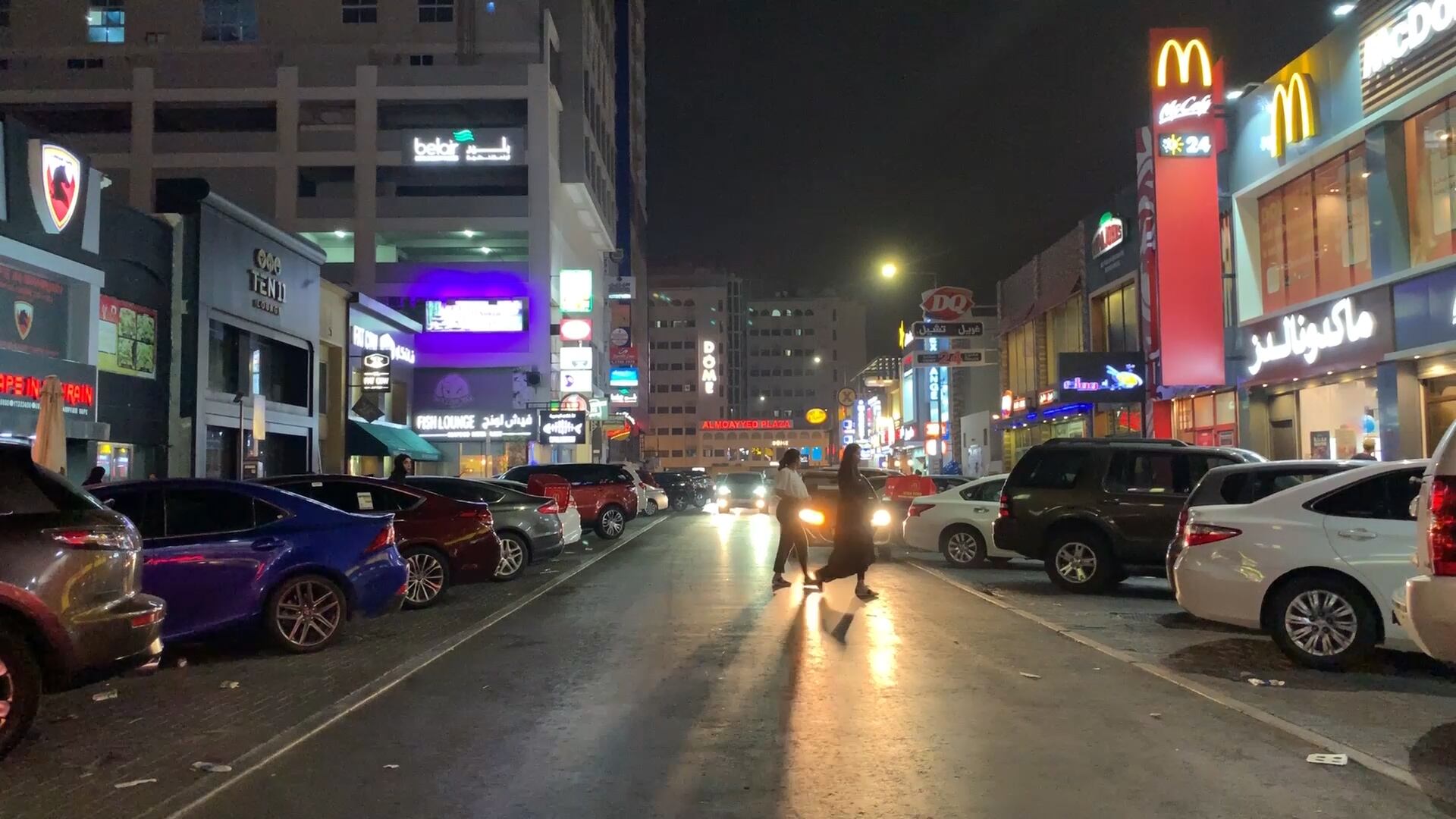
‘They do sex and make u money’
A few weeks before NCIS agents raided Littlejohn’s flat and recovered Raiwest’s passport in 2017, Chief Operations Specialist Jayson W. Grant was browsing the Tinder dating app when the chance to traffic his own Thai women presented itself.
On the evening of Sept. 20, 2017, court records show he began chatting with a Tinder user who appeared similar to Raiwest: a prostitute who offered to provide Grant with trafficked women.
“You know anyone who needs a place to rent?” the 38-year-old chief asked.
“I could get girl from Thailand for u,” the woman texted back.
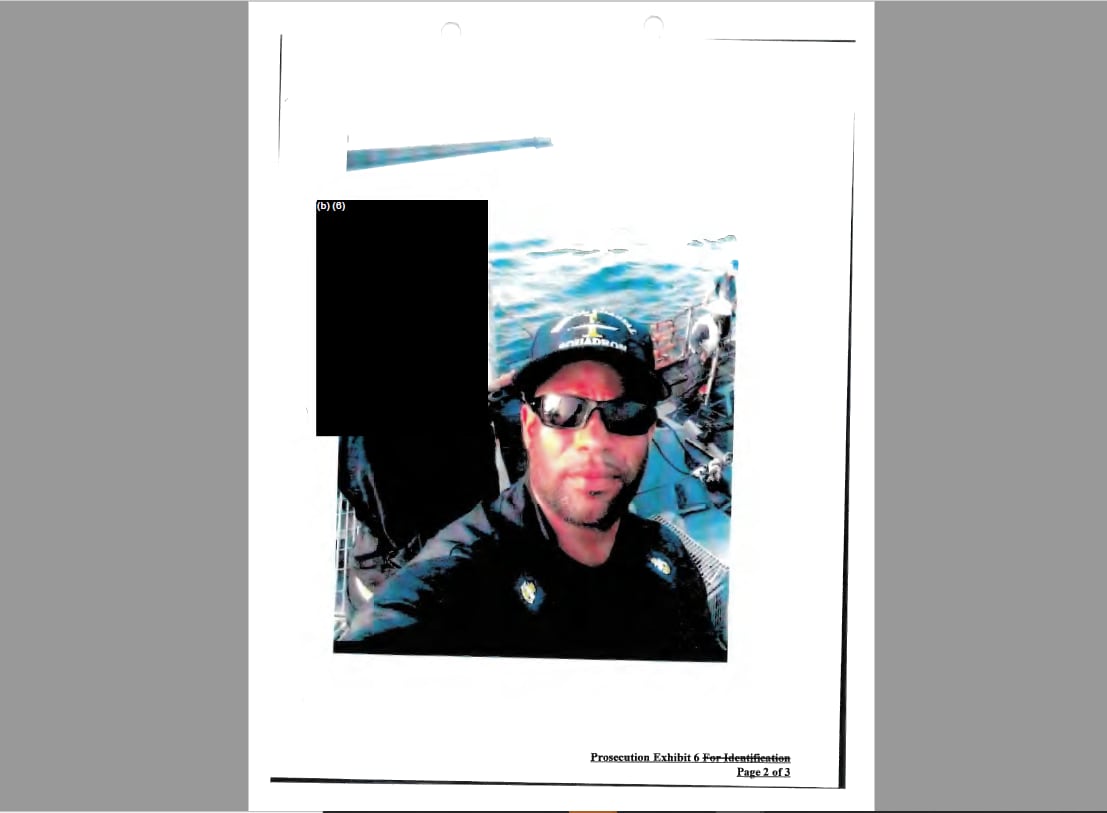
“Sounds good,” Grant answered. “How much money can we make and when can we start?”
“Need to procure Thai girl,” the woman texted back. “They make 120 (Bahraini dinar) a night, U hold passport.”
They then moved their chat over to the WhatsApp encrypted messenger, according to court records.
“They do sex and make u money,” she continued. “I get u Thai that is 16 or 19. Younger more money.”
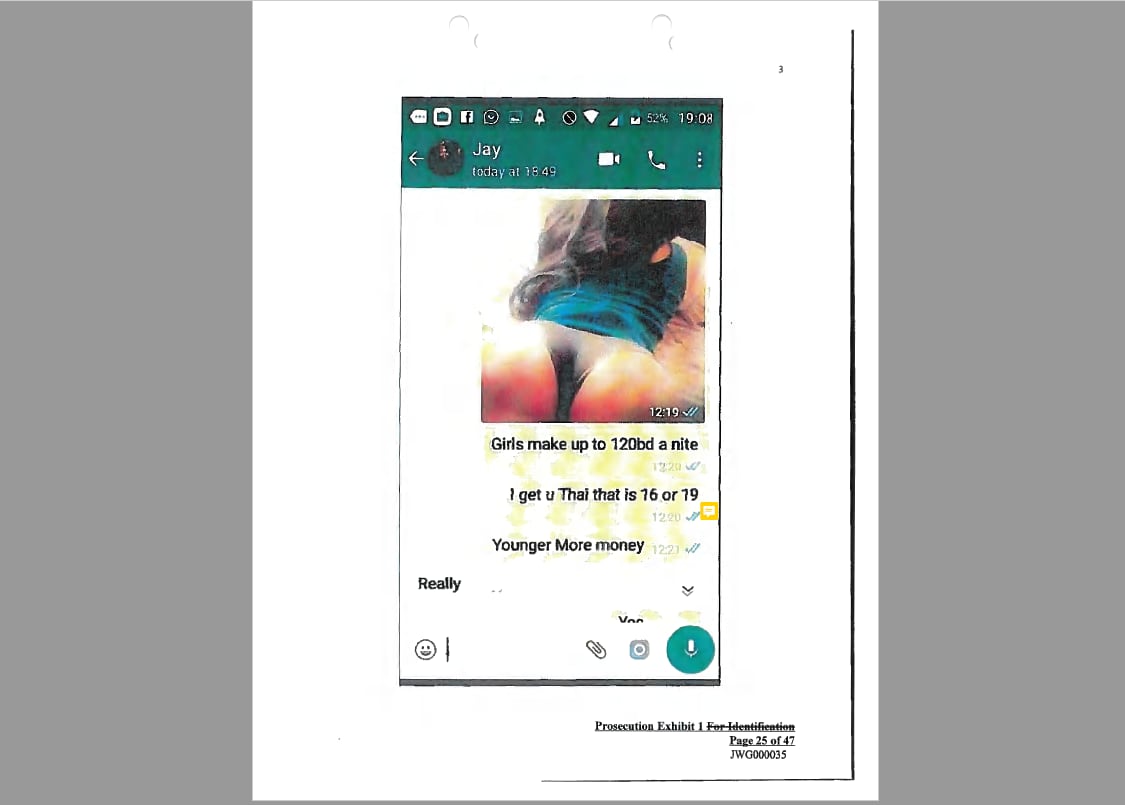
“Nineteen and up,” Grant answered.
The woman told the chief that an American man she referred to as “Boss” would "traffic girls here to Bahrain.”
“They do what they told,” the woman texted. “U work them long time, make lots [sic] money.”
Boss would need to meet Grant first.
“That is the last step,” she told him. “He just need to see u before purchasing girls.”
The chief agreed to meet Boss the following week.
“Are you law enforcement or affiliated with law enforcement?” Grant asked the woman.
“U mean police? No they do not like working gurl [sic]. We could go to jail.”
“Ok good,” the chief replied. “Had to make sure you and your boss aren’t police.”
“Lol no we stay away.”
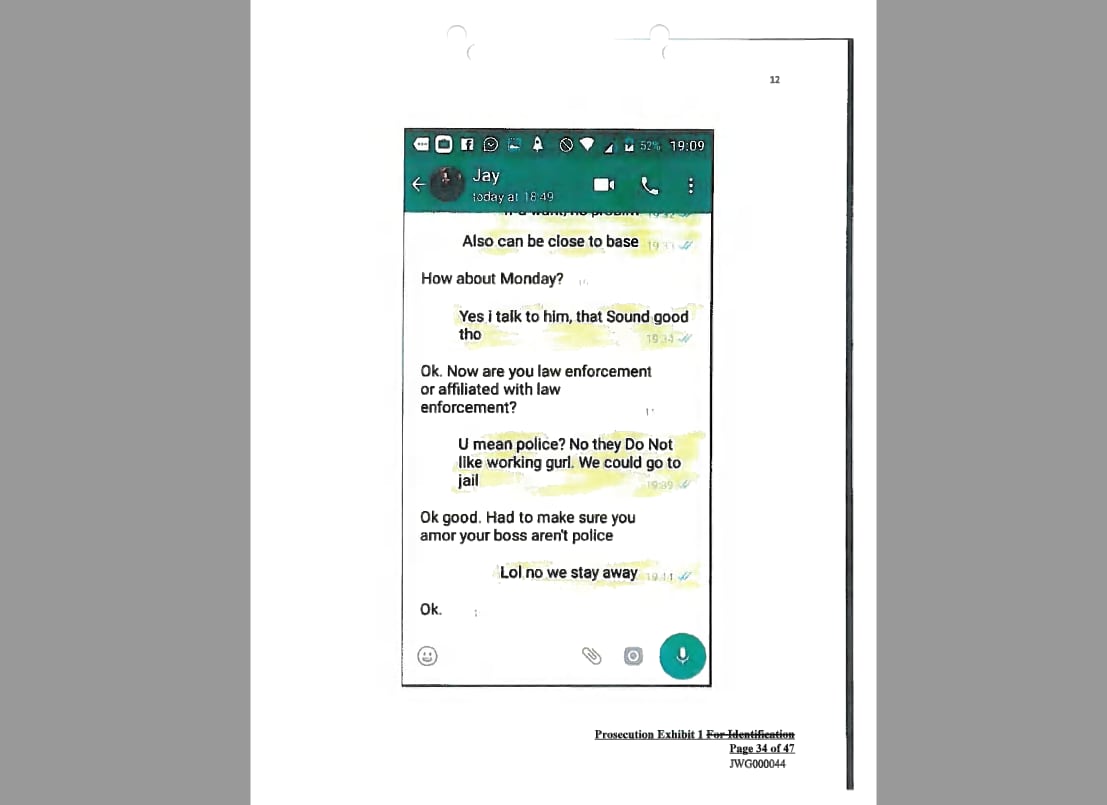
‘When a motherfucking ship pull in!’
Court records suggest Grant had enjoyed a successful Navy career before arriving on the island.
He spent time assigned to SEAL Team 3 and fitness reports sang his praises. One evaluation from his stint with the Japan-based U.S. 7th Fleet lauded Grant for “the successful prosecution of a Foreign Submarine of high National interest.”
A married father from Ohio, Grant had arrived at Naval Surface Squadron 5 in Bahrain earlier in 2017 and was the command master chief’s enlisted adviser, according to Navy records.
But court records also suggest he was going through a divorce and having financial problems.
Grant went to meet “Boss” on Oct. 4, 2017, at the Grand Yard House bar, an Americanized watering hole popular with sailors and prostitutes about 10 minutes from the Navy base.
Boss billed himself as a U.S. contractor who would get three prostitutes into the country and deliver them to the chief’s door.
The women would live with the chief, splitting time on the spare twin beds and sofas in his apartment.
Grant would take their passports.
“I’m nervous about this shit,” Grant told Boss after he sat down for the meeting, according to a transcript of their conversation entered into court records.
“It’s gravy, but you gotta be discreet, dog,” Boss warned the chief. “You can’t be out in the street, don’t be on Facebook with this shit.”
“Naw, I’m real discreet,” Grant assured him.
The women could slide Grants’ cut of the money under his bedroom door each night if he wanted, Boss explained.
They would cook, clean and give him massages.
“And shit, you know, you can fuck ‘em, whatever,” Boss said.
“Your homeboys can’t get no free pussy,” he warned. “Just you. You just hang onto their passports.”
“It’s basically like you’re renting a room,” Boss added. “That’s your cover story.”
Boss pointed out all the Thai prostitutes who already congregated around “American Alley” in the Juffair neighborhood just outside the base.
“I’ll tell you when you’re really gonna make some money, when a motherfucking ship pull in!” Boss told Grant. “Oh my goodness, dog, when a ship pull in!”
“I gotta fuck with that,” said Grant, who asked about the possibility of getting more girls in the future.
Boss told Grant that he himself ran a similar side hustle and urged Grant to make sure he wore a condom if he slept with any of the women.
“I ain’t trying to skeet up in that motherfucker!” Boss said. “I don’t need another damn family out here.”
The next morning, Grant hit the gym, went to work and planned for the arrival of the women later that day.
'You’re a chief’
Grant would soon learn that the person on the other end of his Tinder conversation had been an undercover NCIS agent.
And so was Boss, who had secretly recorded his Yard House sit-down with the chief. A copy of that recording was obtained by Military Times.
NCIS had launched stings to snare would-be sailor-traffickers after Raiwest brought allegations of her foiled plot with Littlejohn to their attention that summer.
With Grant, the NCIS sting had hooked an E-7 and agents brought him in the day after he met with Boss.
“You have any idea why you’re here this morning?” an agent asked the chief in a recording of that interview obtained by Military Times.
“No.”
Grant slumped in his chair as the agent told him he had been caught in a sting.
The agent initially played the role of the good cop.
“Listen man, I don’t want you to beat yourself up,” he told Grant. “You’re going through a divorce, you’re out here, an opportunity presents itself.”
But the U.S. Navy can’t have sailors trafficking women, the agent explained.
“We don’t want girls being brought into Bahrain to work as prostitutes,” the agent said. “Bahrain has a lot of respect for who we are and what we do out here, and we just don’t want our Navy associated with any of that.”
Another agent said NCIS knew sailors were housing prostitutes and getting paid as a side hustle.
“A lot of people are doing this here,” she noted.
Grant claimed he hadn’t understood that the girls would be brought to Bahrain against their will.
But he admitted to the NCIS agents that he already had women living with him and paying rent.
“You are aware that the Navy’s paying your housing and you’re not supposed to be renting out rooms?”

“I didn’t know that,” Grant replied.
“This is bullshit,” one agent said. “I’m not gonna sit here and have you lie to us.”
“You’re a chief petty officer in the United States Navy and you have no idea that you’re not supposed to be housing girls and making a profit off them?” the other asked.
The other agent reminded Grant of the texts they exchanged, and how the agent had specifically used the word “trafficking” and said the girls wouldn’t have a choice.
“I’m literally paying off a pimp and moving them here to have sex on your behalf,” the agent said. “That didn’t raise any red flags to you?”
“It did,” Grant said. “My train of thought was housing.”
“Sounds like you saw a dollar sign,” the agent said.
Grant was later charged and pleaded guilty in February 2019 to attempted human trafficking and attempted labor trafficking offenses, according to court records.
Military judge Capt. Arthur Gaston sentenced Grant to four years in the brig and a dishonorable discharge.
He also will have to register as a sex offender, according to trial records.
Grant’s sentence is believed to be the heaviest handed down by the Navy in connection to the Bahrain cases.
At one hearing, Grant’s defense attorney, Lt. Cmdr. Corey Bean, suggested that undercover agents had taken their sting too far and could have busted the chief solely for the housing infractions.
“If the NCIS agent had not upped the ante and suggested the scheme of importing women from Thailand, this whole thing never would have happened,” Bean argued.
Lt. Cmdr. Keven Schreiber, the lead prosecutor in the case, asked Gaston for a 12-year sentence, citing “the level of callousness with which he was operating.”
“We cannot let our sailors have any question that this is not serious,” he said.
Grant’s legal proceedings took place in Naples, Italy.
He was initially incarcerated at a military prison in Germany, then sent to the Navy brig in Charleston, South Carolina, then to the brig in Miramar, California, and then back to Charleston, according to Bethany Payton-O’Brien, a civilian defense attorney he retained after conviction.
In the next month, Payton-O’Brien told Military Times that she plans to file an appeal “regarding both his court-martial findings and sentence.”
“There are a number of issues that we are raising in this case, including unlawful command influence," she said, referring to Adm. Aquilino’s January 2018 all-hands meeting on the waterfront that addressed the Bahrain cases.
‘Is my career over?’
During his NCIS interrogation, Grant at one point denied trying to bring any other sailors in on the scheme.
But a few seconds later, he admitted to the involvement of his friend, a senior chief.
“Close friend?” an NCIS agent asked.
“Yes, sir.”
The name of that senior chief is redacted in court records obtained by Military Times, but NCIS brought him in that night.
Agents wanted to know more about the texts between the senior chief and Grant, particularly one exchange when the two sailors appeared to discuss trafficking woman and the senior chief texted Grant to “send me two.”
Video footage of the NCIS interview obtained by Military Times blurs the senior chief’s face but not his LaRon Landry Washington Redskins jersey.
The senior chief acknowledged to the agents that he had gone to the Yard House with Grant the night the chief met with Boss, but the senior did not sit in on their conversation. Instead, he ate at a table nearby while Grant and the undercover agent talked.
“(Grant) told me he was thinking of getting into some stupid shit,” the senior chief told agents, claiming that he texted Grant “send me two” as a drunken joke.
“We joke about it because it’s all around,” the senior chief said.
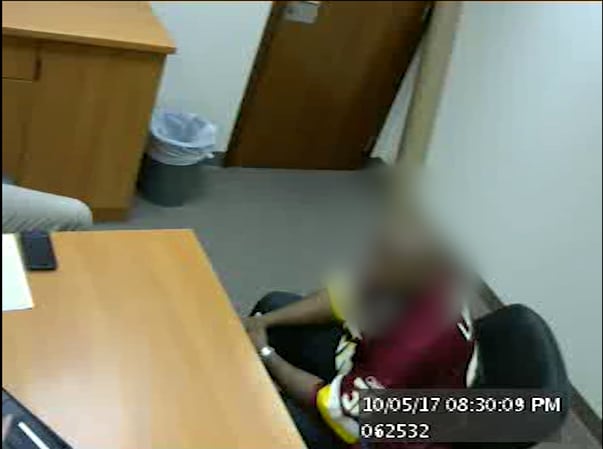
“Does it concern you that he was planning on getting girls trafficked in from Thailand to pimp out?” an agent asked.
“I tried to deter him,” the senior chief said. “But he’s got a financial situation going on in his life, going through a divorce.”
The senior chief also admitted to frequenting prostitutes while stationed there.
“The girls typically go to Wranglers?” an agent asked, referring to a nightclub known for bringing sailors and prostitutes together.
“Everyone go to Wranglers,” the senior chief answered.
As the interview came to an end, the senior chief sat there, deflated.
“Is my career over?” he asked.
“We push it to the command, we push it to legal and they deal with it,” the agent replied.
They noted that the senior chief held a top secret-sensitive compartmentalized information security clearance and could be on the hook for failing to report Grant’s plans.
“The fact that you have a TSSCI clearance, which a very small percentage of people in the United States have, not smart decisions,” one agent told him.
“Watch the company you keep,” the senior said, almost to himself. “I can’t tell my wife?”
“If you want to tell your wife you’re involved in prostitution and adultery, by all means,” the agent replied.
Navy officials declined to criminally charge the senior chief. Instead, he received a punitive letter of reprimand and had to forfeit half a month’s pay, according to Navy spokesman Lt. Timothy Pietrack.
Because the senior was only administratively punished, Pietrack declined to identify him.
“This sailor is no longer stationed in Bahrain,” Pietrack said in 2019.
The Navy cop shakedown
In October 2017, several weeks after Grant and the senior chief were busted, another sailor got caught up in a shakedown scheme involving a prostitute and another sailor who was acting as the woman’s enforcer, according to court records.
The case of Aviation Equipment Support Technician 2nd Class Dennis J. Mullens offers a glimpse into how interwoven prostitutes and sailors had become on the island.
Mullens would later swear he had no idea the woman he slept with one night that month was a prostitute, according to court records. He recalled attending a house party hosted by a Filipina woman he knew. There, he met a woman named Saifon who came to his room at the end of the night.
“She was a little flirty,” Mullens said on the stand during the court-martial of a Navy chief on other Bahrain-based charges in 2018. “We talked a little bit, we hooked up. And that was that.”

But Mullens said he soon began receiving threatening phone messages from another sailor acting as Saifon’s henchman and seeking payment for her services.
Mullens said the sailor was a master-at-arms, or MA ― a Navy police officer.
Through a series of threatening voice messages extracted from his phone by NCIS and obtained by Military Times, the MA told Mullens to pony up $60 for Saifon’s services or she would go to base authorities.
“You need to figure out how you’re gonna pay,” the unnamed MA told the petty officer.
The MA warned that they were “getting ready to make sure base police...know what’s going on.”
“She’s gonna go, and I’ll make sure I show her how to get there,” he added.
Mullens initially told the MA that he was broke and couldn’t come up with the money until payday, according to court records.
“That’s not gonna work,” the man answered. “You’re about to be fucked.”
The petty officer pleaded for more time, but the MA insisted that Mullens had created this problem for himself, according to court records.
“If you knew you didn’t have the money, why the hell did you do this?” the Navy cop asked. “You just hurt yourself right now with getting in trouble and most of all possibly hurt your career and more.”
Mullens at one point was facing court-martial for his alleged role in a separate Raiwest-related case involving two chiefs.
But Mullens later took a deal granting him immunity from prosecution in exchange for his testimony.
Mullens later testified that he met the MA on base during work hours and paid him the cash.
The MA was in uniform “but I don’t remember his last name on the uniform,” Mullens said in court.
The phone records revealing the shakedown were first identified by Brian Pristera, a civilian attorney representing one of the charged chiefs that Mullens testified against. Pristera received Mullens’ phone records as part of the trial’s discovery phase and unearthed the petty officer’s exchange with the unnamed MA regarding the woman.
NCIS officials declined to tell Military Times whether there was any investigation into Mullens’ allegations against the unnamed MA.
Pristera suspects NCIS hadn’t bothered to dig deeply into Mullens’ seized communications or they would have found the evidence of a sailor-on-sailor shakedown.
Pristera questioned Mullens’ credibility during his client’s trial and found it “unbelievable” that the petty officer couldn’t recall the MA’s name.
It wouldn’t be hard, the attorney argued, to identify the MA among the finite cadre of Navy police stationed in Bahrain.
“If it’s an active-duty master-at-arms on base in Bahrain at a known time, this isn’t rocket science,” Pristera told Military Times. “The Navy can’t figure out who this person is…allegedly shaking down someone or engaging in some other type of attempt to bribe?”
Military judge Capt. Arthur Gaston presided over the trial in which the story about Saifon and Mullens emerged.
Pristera presented the Saifon material during a hearing and asked the judge for more time to dig into the situation because, the attorney said, it spoke to Mullen’s credibility as a witness against his client.
Gaston declined to give him more time because it wasn’t relevant enough to the case.
But the judge agreed that evidence of one sailor shaking down another on behalf of a prostitute warranted closer scrutiny.
“NCIS should probably investigate,” Gaston said during a hearing. “It appears there is an MA who was assisting somebody in extorting money from a uniformed servicemember.”
Mullens declined a request for comment for this story.
Military Times contacted the WhatsApp number for Saifon listed in court records in late 2019. The number’s profile picture featured a selfie of a woman with an American flag hung in the background.
When a Military Times reporter texted that number and asked about Saifon and the shakedown, the person on the other end stopped responding.
RELATED

RELATED

RELATED
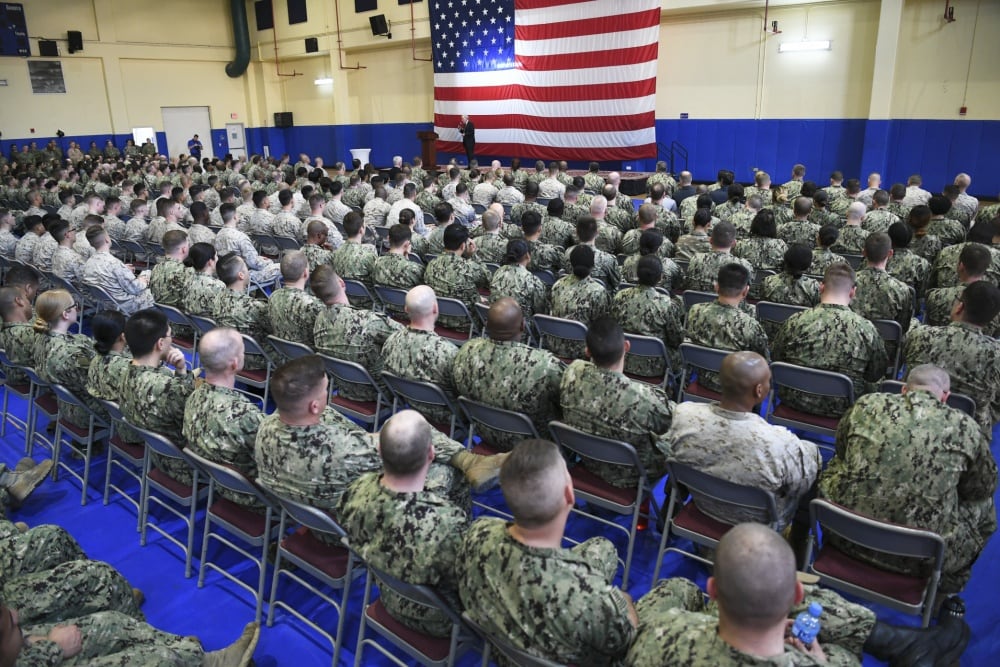
‘A girl in every port’
The Bahrain cases reveal the challenges the Navy faces as it works to shift the sea service away from a culture where patronizing prostitutes at port calls was viewed as a routine part of Navy life for some sailors.
Capt. Greg Smith, the current commander of NSA Bahrain, called the cases “shocking" during an interview in fall 2019.
“You know the old phrase, ‘there’s a girl in every port,’” Smith said. “These are the kinds of things that the Navy has been working culturally to change.”
Bean, the reservist attorney who represented Grant and was stationed in Bahrain until 2019, said misconduct involving prostitutes was not uncommon for sailors in the past: “The repeated phrase was: ‘What goes on on a cruise stays on a cruise.'”
RELATED

“If you look 20 years ago, it was almost a badge of honor to get really drunk and do who knows what on a port call,” Bean said in an interview with Military Times.
The Navy has tried to codify this culture shift via anti-trafficking and anti-sex crime training, part of an ongoing effort to evolve the notion of what is considered acceptable in the ranks.
Smith conceded that his people can’t monitor every sailor every night in Bahrain.
But at the same time, “we can’t just wring our hands and say hey, sailors will be sailors,” he said. “We are trying to be proactive and educate folks so that they know what’s right and wrong.”
Whether the Navy has truly solved the issues that reared up in 2017 in Bahrain remains to be seen.
Sailors are still stationed there. So are the Thai prostitutes.

Bahrain is unique among overseas assignments in that many sailors go there unaccompanied by dependents and don’t really mix with the locals, Bean said.
A recent Pentagon directive is set to end all accompanied tours there.
Overseas assignments like Japan or Italy offer sailors more opportunity to date local women, Bean said.
“That scarcity of having available local women, just because of the cultural differences in Bahrain…certainly made the prostitution business more enticing to someone who wanted to get into that,” he said.
Some critics contend that Navy leaders there knew such a situation was simmering and failed to act, well before Raiwest went to NCIS about her alleged scheme with Littlejohn.
Stephen Karns, a civilian attorney who at one point represented a sailor being investigated for involvement with prostitutes, wrote to Navy lawyers in 2018 and questioned whether higher ups had been ignoring the systemic problems in Bahrain that led to the cases.
The Navy’s leadership had turned a blind eye to such interactions and only acted when the issue metastasized into reports of human trafficking, he argued.
“The command and law enforcement understood that prostitution, especially in foreign countries, goes hand-in-hand with human trafficking,” Karns wrote.
Higher-ups have dodged responsibility for things getting to this point in Bahrain, Karns wrote.
“I’m not saying no action should be taken against these Sailors,” he added. “I believe some action should be taken against the command.”
Did you serve in Bahrain? Email geoffz@militarytimes.com to share your experience.
Geoff is the managing editor of Military Times, but he still loves writing stories. He covered Iraq and Afghanistan extensively and was a reporter at the Chicago Tribune. He welcomes any and all kinds of tips at geoffz@militarytimes.com.





